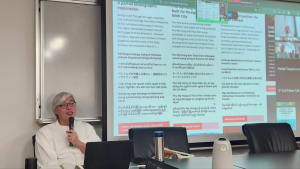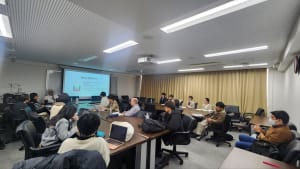News
JF-GJS Fellow Talk Series 4「Southeast Asian Can Think Outside Southeast Asia」が開催されました
Post-Seminar Summary: Dr. Karl Ian Cheng Chua's Lecture on Southeast Asian Scholarship in Global Academia
On January 9, 2025, the Japan Foundation-Global Japan Studies (JF-GJS) Initiative and the Institute for Advanced Studies on Asia, University of Tokyo, hosted the fourth installment of the JF-GJS Talk Series. Dr. Karl Ian Cheng Chua, Assistant Professor at the Asian Center, University of the Philippines, delivered a lecture titled “Southeast Asians Can Think Outside of Southeast Asia”, exploring the challenges and opportunities for Southeast Asian scholars in global academia, particularly within Japanese Studies.
Dr. Cheng Chua discussed how academic knowledge production remains dominated by Anglo-American and Japanese institutions, with English as the global academic language. This structural imbalance often confines Southeast Asian scholars to topics focused on their own region, making it difficult to engage in broader academic conversations on equal terms. He highlighted how Japanese Studies, shaped by both the Anglo-American and East Asian spheres, leaves Southeast Asian scholars navigating dual pressures while struggling for visibility. Many scholars attempt to bridge this gap by publishing in “semi-centers,” but this reinforces linguistic and financial peripherality rather than creating truly independent research spaces.
The discussion also examined the notion of “marginal knowledge,” where Southeast Asian scholars engage with dominant academic frameworks but remain dependent on them. Dr. Cheng Chua suggested that shifting toward “provincial knowledge” produced in local linguistic and academic systems could help build independent intellectual spaces. However, this requires stronger institutional support, collaborative regional networks, and alternative publishing platforms that prioritize Southeast Asian perspectives rather than adapting to dominant academic models.
The lecture also addressed Japan’s initiatives to collaborate with Southeast Asia, including the Abe Initiatives and Kishida’s WA Project 2.0. While these programs provide opportunities, they often reinforce hierarchical relationships, positioning Southeast Asian scholars as research subjects rather than equal intellectual partners. True collaboration, Dr. Cheng Chua argued, requires moving beyond one-way knowledge transfer. Southeast Asian scholars should play active roles in shaping research priorities, leading projects, and co-designing collaborative frameworks. Japan, in turn, must recognize Southeast Asian scholars as contributors of original knowledge, rather than as passive participants in academic partnerships.
Following the lecture, Dr. Maria Thaemar Camanag Tana, JF-GJS Fellow at the Institute for Advanced Studies on Asia, provided a response reinforcing the need for Southeast Asian scholars to reclaim agency in global academia. She emphasized the importance of reframing peripherality as a strength by developing independent research networks, promoting regional collaboration, and advocating for more inclusive publishing practices. The discussion raised key questions about how Southeast Asian scholars can assert their intellectual authority, how
multilingual publishing and translation can enhance visibility, and how partnerships with Japan can evolve to ensure more equitable collaborations.
The Q&A session explored the role of funding for regional research networks, the potential of digital platforms in overcoming language barriers, and strategies for strengthening Southeast Asia-led academic initiatives. Dr. Chua’s lecture underscored the urgent need for systemic change, where Southeast Asian scholars are not seen as peripheral but as central to shaping global knowledge production. His insights provided a critical framework for rethinking academic hierarchies, fostering genuine collaboration, and ensuring that Southeast Asian scholarship is recognized on its own terms.
Written by Dr. Maria Thaemar Camanag Tana
当日の様子
開催情報
日時:2025年1月9日(木)9AM-10:30AM(日本時間)
会場:東京大学東洋文化研究所第1会議室、Online (Zoom)
題目:Southeast Asian Can Think Outside Southeast Asia
講演者:Dr. Karl Ian Cheng Chua
Karl Ian Uy CHENG CHUA is presently an Assistant Professor of the Asian Center, University of the Philippines - Diliman. Until 2020, he was Director of the Japanese Studies Program, Ateneo de Manila University. He is the Philippine Steering Committee Member of the Japanese Studies Association of Southeast Asia (JSA-ASEAN). He is part of the editorial board of Social Science Diliman and East Asian Journal of Popular Culture of Popular Culture. He also is part of the editorial advisory board for "Comic Studies: Aesthetics, Histories and Practices" which is a series by Brill.
司会:Dr. Maria Thaemar Camanag Tana
Maria Thaemar Camañag Tana holds a Ph.D. in Japanese Studies from the National University of Singapore and an M.A. in International Studies from De La Salle University Manila. She is a non-resident fellow at the Stratbase ADR Institute and a Japan Foundation-Global Japan Studies Fellow at the Institute for Advanced Studies on Asia, University of Tokyo. Previously, she served as an Associate Professor in the Department of Political Science at the University of the Philippines Diliman. Her research focuses on Philippine-Japan relations, Japanese foreign policy, and Philippine foreign policy, with numerous publications on these topics. Dr. Tana will join the Japanese Studies Program of Ateneo de Manila University in 2025.
概要:The seminar explores the challenges faced by Southeast Asian scholars in Japanese Studies, who often contend with the dominance of Anglo-American and East Asian academic centers. To navigate these spaces, scholars adopt strategies such as publishing in “semi-centers” or producing “marginal” knowledge, as identified by Ben-Ari (2017). While these efforts contribute valuable insights, they are often dismissed due to perceptions of peripherality. The discussion highlights innovative contributions by Southeast Asian scholars, including Linh (2021) and Rastati (2022), that challenge traditional paradigms in Japanese Studies and demonstrate the transformative potential of knowledge from the periphery. It also critiques Japan’s collaborative initiatives with Southeast Asia, such as the 2015 Abe Initiatives and Kishida programs, emphasizing the need for partnerships based on mutual respect and equality. Collaborative approaches that engage with rather than for Southeast Asian scholars are thus necessary to foster an academic environment that fully recognizes their contributions as integral to global discourse.
使用言語:英語
主催:JF-GJS Initiative, Institute for Advanced Studies on Asia, The University of Tokyo
登録種別:研究活動記録
登録日時:TueMar2510:22:142025
登録者 :GAS事務局・多田
掲載期間:20250326 - 20250625
当日期間:20250109 - 20250109



